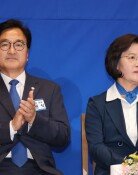Have Confidence in Economy: Expert
I met Professor Amsden just before the new start of the Korean fiscal year of 2007. She said, My belief in the economic growth of Korea has not changed once in 27 years, emphasizing, Koreans need to have more confidence in it.
― You had a positive analysis on Korean conglomerates or chaebol in your highly appraised classic on Koreas economic development, The Rise of the Rest: Challenges to the West from Late-Industrializing Countries. However, some have a negative perspective of them in Korea. Is your view still the same?
Thats right. I used to search 30 major companies involved in steel and shipbuilding in 1979, analyzing Koreas growth drivers. It was when I participated in the IBRDs program on analyzing newly emerging countries economic development. When I was doing my research, tirelessly following workers, I had a deep impression of the passion and determination of Korean companies. Major companies dubbed as chaebol still play a major role in developing the world-class technologies and creating jobs. They are the core stakeholders in possession of high quality education content for the future.
― The current government was stringently hard on chaebol reform, whose procedures had an impact on the public sentiment toward major conglomerates.
Toward a vaster size and longer history of family-owned enterprises, two phenomena are inevitable in any country. First, the family members start to fight among themselves. They are engaged in fierce confrontations on the corporate ownership and fortunes, be they among brothers, daughters-in-law and parents-in-law or a son and a father. Second, people start to hate that company, which has grown too big to be loved. So regulations and reforms on chaebol at this point have some desirable aspects. However the bottom line has to be that there have to be genuine reforms for the company and the Korean economy. Merely adopting foreign regulations, as if to mimic them, has to be avoided.
― Do you mean that Koreas chaebol reforms are tilted toward foreign standards?
In some aspect, yes. For example, easing regulations for foreign companies to do a hostile M&A was more for foreign investors than Korean counterparts. It was in a way to open the door for foreigners to devour the fruits generated by tireless efforts of Koreans. Those who stick to the logic of global standards or opening of the financial market alone mostly proceed dogmatic arguments. Some of them may sound logically right but inapplicable in some way. They just meet the needs of foreign investors.
― Recently, second and third generations of chaebol tend to be feasible heirs apparent. How do you see the actual succession of the corporate ownership?
It would be different from the previous succession for sure. More focus and wide attention are on corporate achievements these days. Even if the corporate ownership is succeeded to the second and third generations, they inevitably turn de-seated if they are not competent enough. True, they may exercise their right with some designated shares, but if a company starts to fail due to a managers fault, the stock value plummets, leaving little room to exercise power.
― Do you think that the Korean governments chaebol reform directions have influenced the economic downturn as well?
The Korean economy has faced some difficulties since joining the Organization for Economic Co-operation and Development (OECD) because Koreas typical ways for its high growth were all abandoned all of a sudden, trying to comply with the global standards. In addition, Korea had to open its financial market as it went through the foreign exchange crisis. But there is no exact identity of the global standards, which is a mere abstract term.
Professor Amsden recently finished writing her book with a temporary title, Escape from the Empire where, on the basis of her analysis of Chile, Indonesia and India, she sends a message that the newly emerging economies should not be shaken by the logic of economic power, finding their own ways to growth.
― What about a Free Trade Agreement (FTA)? The U.S. makes an open criticism on Korea being extremely closed-minded during the bilateral negotiations.
Turn to Japan, Koreas neighboring country. It persisted not opening its market despite the U.S. numerous threats to do so. What I am trying to say here is that a country has to be strategic in global negotiations where its financial interests are at stake. Marketing opening itself has many boons, but the conditions for opening become the hot potato. Korea has to think in its own way with much forethought before recklessly meeting the U.S. requests.
― A look at the recent economy of Korea reveals that your rosy expectations turned out wrong in a way. It is hard to view Korea as the Next Giant now, right?
It was like this 20 years ago. Koreans tend to be always jittery, thinking they are inadequate although they are doing fine. Such fear and pessimism are exaggerated more than necessary. But the obstacles occurring in foreign relations due to North Koreas nuclear issues might have an impact on the economy to some extent.
― Various figures show Koreas sluggish growth rate vis-à-vis other Southeast Asian countries or newly developing ones.
That is because each country has a different developmental stage. Some, which have just entered a high growth stage and others that have surpassed that stage, have different growth speeds. The current obstacle facing Korea is different from the existing ones, meaning surpassing 0.1 percent of economic growth is just so hard, especially without technological innovation and frontier sprits. However it is not overall gloomy at all. The following up by China is not regarded as a threat as most think.
― How would the Norths nuclear issues would influence the economy in the longer haul? Morgan Stanley even predicted that foreign investors aversion toward Korea would lead to the phenomenon of Sell Korea worth 10 trillion won next year.
(Showing the cup she held) The nuclear weapons North Korea reportedly fired were like a little tea bag inside this cup very small and not explosive. They would not greatly influence the Korean economy next year. Rather I want to pinpoint the issue of foreign capital being taken away from Korea with the excuse on North Korea. The view here is not on the actual risk underway in Korea but the actual damage done on to it. What if some penalties are imposed to prevent foreign capital from being freely taken away? (laughter)
About the one-and-an-half-hour interview, Professor Amsden said, I wanted to establish a Korean research institute in MIT, but it was in vain, asking for feasible measures to make it happen. She said that she used to actively push the plan forward but as Daewoo Group who promised for support collapsed, it has been permanently suspended. She hinted how she still hopes to see it saying, Wouldnt it be great if the institute is called KIM, that is Korea Institute of MIT?
lightee@donga.com







